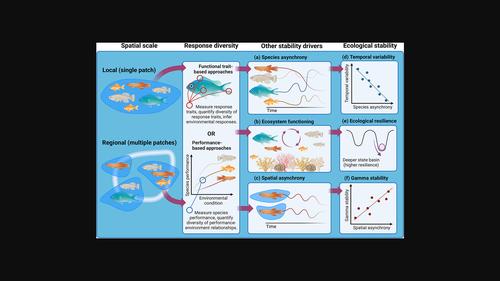当前位置:
X-MOL 学术
›
Ecol. Res.
›
论文详情
Our official English website, www.x-mol.net, welcomes your feedback! (Note: you will need to create a separate account there.)
Limited theoretical and empirical evidence that response diversity determines the resilience of ecosystems to environmental change
Ecological Research ( IF 2 ) Pub Date : 2023-11-30 , DOI: 10.1111/1440-1703.12434 Samuel R. P.‐J. Ross 1 , Takehiro Sasaki 2
Ecological Research ( IF 2 ) Pub Date : 2023-11-30 , DOI: 10.1111/1440-1703.12434 Samuel R. P.‐J. Ross 1 , Takehiro Sasaki 2
Affiliation

|
Response diversity describes the variation in species' ecological responses to environmental change, where higher response diversity represents a greater variety of species–environment responses. The concept complements the insurance hypothesis that biodiversity increases and stabilizes ecosystem functions because population declines of one species with environmental change are compensated for by opposing responses of others. Accordingly, response diversity is a promising, but still largely untested, candidate mechanism explaining the generally positive relationship between biodiversity and ecosystem stability across a range of systems. In the 10 years since, Mori et al. (2013, Biological Reviews, 88, 349–364) reviewed the relationship between response diversity and ecological resilience (a key dimension of stability), the topic has garnered significant attention. Their review has attracted over 600 citations to date and continues to be well cited. However, in a recent review of empirical work on response diversity, we found fewer than 50 studies empirically measuring what the authors called response diversity. Here we discuss possible reasons for the slow uptake of empirical response diversity research, including lack of standardized methods and heavy data requirements, as well as next steps to achieve a robust framework for empirical research on response diversity and stability, such as by leveraging new methods and coordinating research efforts through interdisciplinarity. By identifying a disconnect between interest in response diversity and theoretical and empirical work on the topic, we hope this article will shed light on the challenges studies of response diversity must overcome, in turn catalyzing new avenues of research on response diversity, ecological stability, and ecosystem functioning.
中文翻译:

有限的理论和经验证据表明,响应多样性决定了生态系统对环境变化的恢复力
响应多样性描述了物种对环境变化的生态响应的变化,其中较高的响应多样性代表物种-环境响应的多样性。这一概念补充了保险假说,即生物多样性增加并稳定了生态系统功能,因为环境变化导致的一个物种的种群数量下降可以通过其他物种的相反反应得到补偿。因此,响应多样性是一种很有前景但尚未经过检验的候选机制,可以解释一系列系统中生物多样性与生态系统稳定性之间普遍存在的正相关关系。此后的 10 年里,Mori 等人。(2013, Biological Reviews , 88 , 349–364) 回顾了响应多样性和生态恢复力(稳定性的一个关键维度)之间的关系,该主题引起了广泛关注。迄今为止,他们的评论已获得 600 多次引用,并且继续被广泛引用。然而,在最近对反应多样性实证研究的回顾中,我们发现只有不到 50 项研究以实证方式衡量了作者所说的反应多样性。在这里,我们讨论实证反应多样性研究缓慢采用的可能原因,包括缺乏标准化方法和繁重的数据要求,以及为反应多样性和稳定性实证研究建立稳健框架的后续步骤,例如利用新方法通过跨学科协调研究工作。通过确定对响应多样性的兴趣与该主题的理论和实证工作之间的脱节,我们希望本文能够阐明响应多样性研究必须克服的挑战,进而催化响应多样性、生态稳定性和生态学研究的新途径。生态系统功能。
更新日期:2023-11-30
中文翻译:

有限的理论和经验证据表明,响应多样性决定了生态系统对环境变化的恢复力
响应多样性描述了物种对环境变化的生态响应的变化,其中较高的响应多样性代表物种-环境响应的多样性。这一概念补充了保险假说,即生物多样性增加并稳定了生态系统功能,因为环境变化导致的一个物种的种群数量下降可以通过其他物种的相反反应得到补偿。因此,响应多样性是一种很有前景但尚未经过检验的候选机制,可以解释一系列系统中生物多样性与生态系统稳定性之间普遍存在的正相关关系。此后的 10 年里,Mori 等人。(2013, Biological Reviews , 88 , 349–364) 回顾了响应多样性和生态恢复力(稳定性的一个关键维度)之间的关系,该主题引起了广泛关注。迄今为止,他们的评论已获得 600 多次引用,并且继续被广泛引用。然而,在最近对反应多样性实证研究的回顾中,我们发现只有不到 50 项研究以实证方式衡量了作者所说的反应多样性。在这里,我们讨论实证反应多样性研究缓慢采用的可能原因,包括缺乏标准化方法和繁重的数据要求,以及为反应多样性和稳定性实证研究建立稳健框架的后续步骤,例如利用新方法通过跨学科协调研究工作。通过确定对响应多样性的兴趣与该主题的理论和实证工作之间的脱节,我们希望本文能够阐明响应多样性研究必须克服的挑战,进而催化响应多样性、生态稳定性和生态学研究的新途径。生态系统功能。



























 京公网安备 11010802027423号
京公网安备 11010802027423号